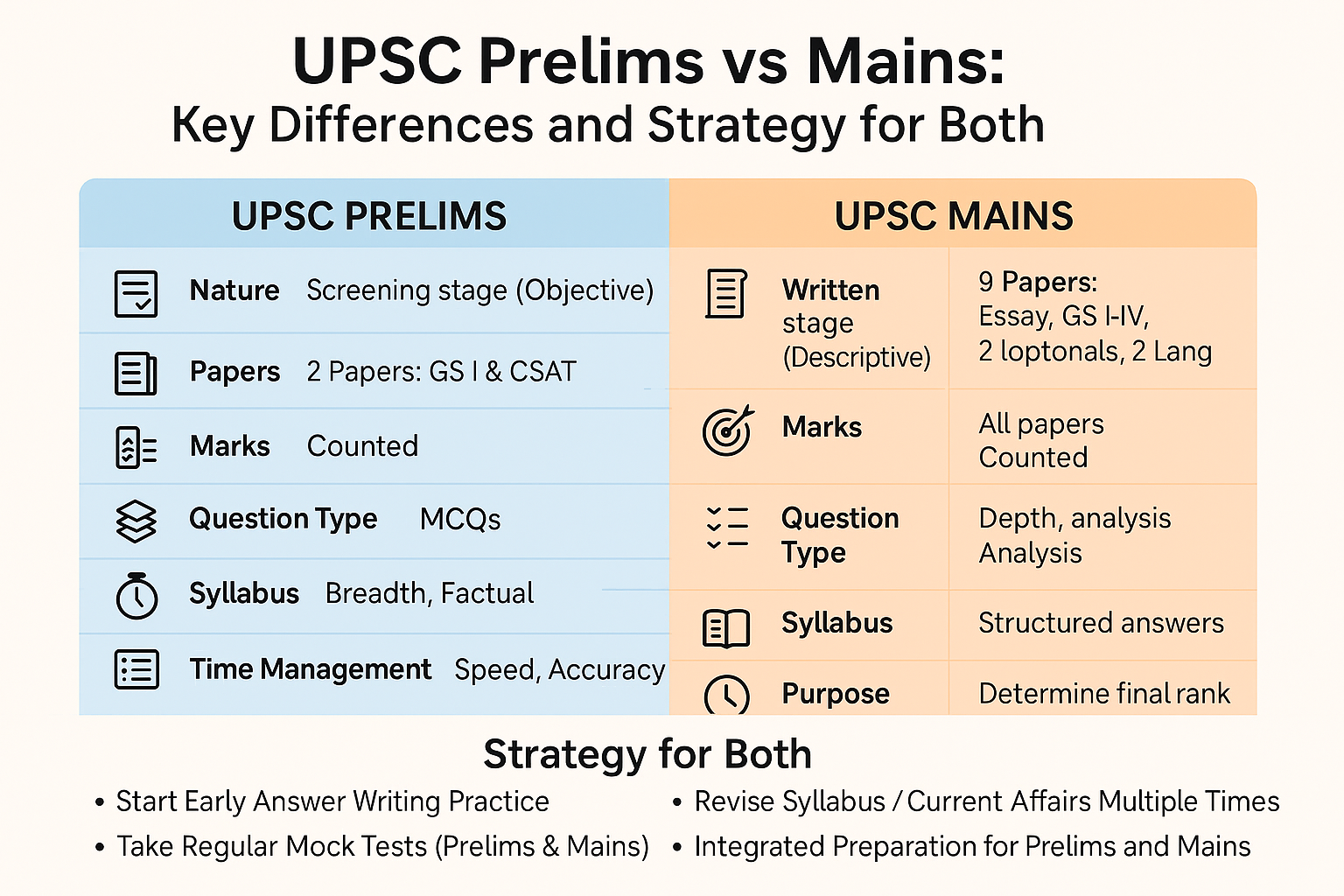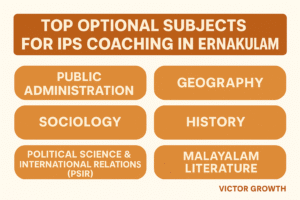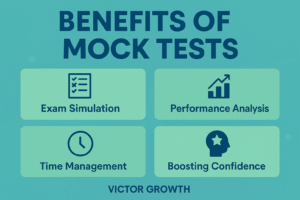The UPSC Civil Services Examination (CSE) is conducted in three stages – Prelims, Mains, and Interview. Among these, Prelims and Mains are the most crucial phases that determine whether an aspirant advances in the competition. Although both stages are part of the same exam, they differ greatly in pattern, focus, and preparation strategy.
Understanding the differences between UPSC Prelims and Mains, and designing a strategy tailored to both, is essential for success.
UPSC Prelims vs Mains – Key Differences
| Feature | UPSC Prelims | UPSC Mains |
|---|---|---|
| Nature of Exam | Screening stage (objective type) | Descriptive, written stage |
| Papers | 2 Papers: GS I & CSAT (GS II) | 9 Papers (Essay, 4 GS, 2 Optional, 2 Language papers) |
| Marks | Only GS I marks counted for selection; CSAT is qualifying | All 7 merit-based papers (1750 marks) count for ranking |
| Question Type | Multiple-choice questions (MCQs) | Analytical, descriptive answers |
| Syllabus Coverage | Broad and fact-based | In-depth, analytical, and opinion-based |
| Purpose | To shortlist candidates for Mains | To test knowledge, analysis, writing skills, and depth |
| Time Management | Speed + accuracy crucial | Structured writing + time allocation for each question |
| Result Impact | Qualifying only, marks not counted in final merit | Heavily influences final rank |
| Difficulty Level | Tricky with emphasis on elimination | Requires conceptual clarity, interlinking, and articulation |
Strategy for UPSC Prelims
The Prelims exam is the first barrier. Since it is objective in nature, the strategy must be focused on facts, clarity, and speed.
How to Prepare for Prelims
NCERTs First – Build a strong foundation with NCERTs (Class 6–12).
Standard Books – Read Laxmikanth (Polity), Spectrum (History), GC Leong (Geography), Ramesh Singh (Economy), and Shankar IAS (Environment).
Current Affairs – Daily newspaper reading (The Hindu / Indian Express) + monthly compilations.
Practice MCQs – Daily practice of objective questions to develop elimination techniques.
Mock Tests – Take at least 40–50 tests before Prelims to master accuracy and time management.
Revision – Multiple revisions of the same sources are more effective than reading new material.
Prelims-Specific Tips
Develop an elimination strategy for tricky MCQs.
Focus equally on static subjects and current affairs.
Never neglect CSAT; it is qualifying, but many aspirants fail due to overconfidence.
Strategy for UPSC Mains
The Mains exam is the real battleground. It tests not only knowledge but also analytical ability, clarity of thought, and writing skills.
How to Prepare for Mains
Understand the Syllabus – Be thorough with all four GS papers and the Essay.
Optional Subject – Choose wisely based on interest, availability of resources, and scoring trend. Dedicate at least 2 hours daily.
Answer Writing Practice – Start practicing early. Use the Introduction–Body–Conclusion (IBC) format. Add flowcharts, diagrams, and case studies.
Current Affairs Integration – Relate contemporary events with GS topics (e.g., linking economic reforms with GS III Economy).
Essay Practice – Write at least one essay every week. Balance facts with analysis.
Mock Tests – Regularly join a Mains test series to improve presentation and time management.
Mains-Specific Tips
Develop multi-dimensional answers (social, economic, political, ethical).
Use real-life examples, government schemes, and reports.
Focus on clarity and simplicity rather than ornamental language.
Prelims vs Mains – How to Balance Preparation
Many aspirants make the mistake of focusing only on Prelims first and then rushing into Mains. A balanced approach is key.
Integrated Preparation – Start with NCERTs and standard books; they are useful for both Prelims and Mains.
Parallel Practice – Practice Prelims MCQs and Mains answer writing simultaneously.
Prelims Focus Phase – Dedicate 2–3 months before Prelims exclusively to MCQs and revision.
Post-Prelims Phase – Shift fully to answer writing and Mains mocks.
Final Key Takeaways
Prelims = Breadth, Speed, and Accuracy
Mains = Depth, Analysis, and Presentation
Both require discipline, multiple revisions, and current affairs mastery.
Integrated preparation ensures smooth transition between stages.
FAQs on UPSC Prelims vs Mains
Q1. Are Prelims and Mains preparation different?
Yes. Prelims focuses on facts and MCQs, while Mains emphasizes depth, analysis, and written expression.
Q2. How many months should I dedicate for Prelims exclusively?
At least 2–3 months before the exam should be devoted only to Prelims practice and revision.
Q3. Should I start answer writing before clearing Prelims?
Yes. Early answer writing practice builds expression and clarity, which is essential for Mains.
Q4. Is CSAT preparation important?
Yes. Many candidates fail CSAT due to overconfidence. Even though it is qualifying, it requires consistent practice.
Q5. Which stage is more important – Prelims or Mains?
Mains is more important for final ranking as it carries 1750 marks, but you cannot reach Mains without clearing Prelims.
Q6. How many mock tests should I take for Prelims and Mains?
For Prelims, 40–50 tests are ideal. For Mains, write at least 15–20 full-length tests before the exam.
Q7. Can I use the same study material for both Prelims and Mains?
Yes. NCERTs, standard books, and current affairs overlap. Only the method of preparation (MCQ practice vs answer writing) changes.
✅ SEO Keywords Integrated: UPSC Prelims vs Mains, difference between UPSC Prelims and Mains, IAS exam strategy, UPSC preparation tips, Prelims vs Mains UPSC strategy, UPSC Prelims preparation, UPSC Mains preparation, IAS Prelims vs IAS Mains.







